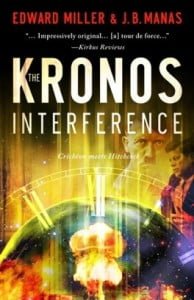Finding the Magic: Three Ingredients for a Memorable Thriller / J. B. Manas
Irony, humor, and catharsis have been helping us tell better stories since Aristotle’s Poetics—and were probably there, instinctually, in the work of the best tale-spinners even before the terms had names. This week’s guest blogger, author J. B. Manas, applies these analytical essentials to successful thrillers to help us all upgrade our stories from “excellent” to “unforgettable”.Happy reading! Clay StaffordFounder Killer NashvillePublisher / Editorial Director Killer Nashville Magazine
Clay StaffordFounder Killer NashvillePublisher / Editorial Director Killer Nashville Magazine
 Finding the Magic: Three Ingredients for a Memorable Thriller
Finding the Magic: Three Ingredients for a Memorable Thriller
By J.B. Manas
For many of us, writing comes fairly easy. But giving it that extra, elusive “something” that lifts the story above others of its type? Creating a story that’s buzzworthy, emotionally satisfying, and able to withstand the test of time? That’s the difficult part. I like to call this “finding the magic”.
As I work on my current novel, a sci-fi thriller titled Atticus, I’ve been analyzing what elements it absolutely must have if it is to grip readers and lure potential fans. If we look at some of history’s greatest thrillers and adventure stories in literature and film, what variables elevate them above the crowded sea of mediocrity?
Sure, any good thriller has to have the usual things: compelling characters, snappy dialogue, a lead with a goal, a strong villain, high stakes, mounting conflict; the list goes on and on. While vitally important, these things are merely the staples of writing thriller and adventure stories. They have to be there, or the book will quickly fade into oblivion. But how do you find the magic that takes a thriller from good to great?
I’ve narrowed it down to three special ingredients: irony, humor, and catharsis. Let’s look at each.
1. Isn’t it Ironic?
A touch of irony can often be the missing ingredient that a story needs to take it to another level. For instance, in Jaws, a water-phobic sheriff must stop a great white shark that’s been devouring swimmers in high tourist season at the beach. Not just a sheriff, but a water-phobic one! In Jurassic Park, a paleontologist who hates kids has to spend much of the story rescuing two kids when real live dinosaurs run amok in a theme park. In Silence of the Lambs, to whom does Clarice Starling have to bare her soul in order to catch a serial killer? Why, another serial killer, of course!
When writing my debut novel with co-author Ed Miller, The Kronos Interference, I ruminated on this. In the story, a physicist is called to investigate an unusual deep-sea discovery. It takes him on a time-traveling journey that defies logic and, in some cases, science. So I suggested we start him out as a jaded skeptic who relies on “just the facts”. It was subtle irony, but it was there, and I like to think it made a difference.
2. The Best Medicine
Alfred Hitchcock often spoke about the need to balance tension with humor, and he was certainly a master at it, as evident in North by Northwest, with Cary Grant quipping his way through increasingly dire circumstances. This is also what made the second Star Wars film, The Empire Strikes Back, such a standout, with the witty banter between Han, Luke, and Princess Leia. And think of the scene in Jurassic Park, after a scared young boy barely escapes death when the car he was trapped in plummeted down a tree following a terrifying T-Rex chase. His only words to his rescuer, Alan Grant, are, “I threw up.”
In my current work-in-progress, Atticus, the lead character is a 22-year-old geek girl who works in a comic book shop. So when a falling military craft nearly runs her off the road, and her rescue of a British amnesiac survivor leads them both to be chased by government assassins, on whom does she rely for help? Her geeky ex-boyfriend and his gruff veteran cop uncle. This allows for lots of pop culture references, generation-gap quips, and funny dialogue to offset the tense situations that follow.
3. A Perfect Ending
Silence of the Lambs was an exceptional story for many reasons. But, in the movie version, what made filmgoers exit the theaters with that elusive giddy feeling was not only psychotic cannibal Hannibal Lecter telling rookie FBI agent Clarice Starling, “The world is more interesting with you in it,” but also, his final line, “I do wish we could chat longer, but I’m having an old friend for dinner.”
Not only was this funny AND ironic, but it was a delicious (pardon the pun) way to: (a) leave a final wink at Hannibal Lecter’s relationship with Clarice Starling, (b) offer just desserts (again, pardon the pun) for the corrupt Dr. Chilton, and (c) give a glimpse of Lecter enjoying his hard-earned freedom. This was cathartic on many levels, and I would argue, more powerful than the resolution of the main plot—the rescue of the senator’s daughter and the death of the main antagonist, Buffalo Bill.
In order for a catharsis to be achieved at the end, the groundwork must be laid. Strong character subplots must be put in place—a wish for something, a need for retribution, a relationship in need of healing. It should be over and above the resolution of the main plot. And it’s what I’m focused on now as I refine my current novel beyond its main, twisty plot and its (hopefully) colorful characters. Does your story have a cathartic ending? If not, what could be done to add one? I’d love to hear from you.
J. B. Manas is a Philadelphia-based author of fiction and nonfiction. His debut novel with co-author Edward Miller, The Kronos Interference, was named to Kirkus Reviews’ Best of 2012, and earned a starred review. He is currently working on a sci-fi thriller, Atticus, targeted for release in 2016. His nonfiction books on organizational management and lessons from history have been translated into eight languages and course-adopted in universities worldwide. Manas is an avid movie buff, pop culture maven, popular comic con speaker, art lover, world traveler, songwriter and guitarist, technology geek, wine connoisseur, and an armchair philosopher–all of which make their way into his writing at one time or another. Visit his website at www.jbmanas.com or email him at jb@jbmanas.com.
(To be a part of the Killer Nashville Guest Blog, send a query to contact@killernashville.com. We’d love to hear from you.)
Thanks to Tom Wood, Emily Eytchison, and publisher/editorial director Clay Stafford for their assistance in putting together this week’s blog.
For more writer resources, visit us at www.KillerNashville.com, www.KillerNashvilleMagazine.com, and www.KillerNashvilleBookCon.com.
And be sure to check out our new book, Killer Nashville Noir: Cold-Blooded, an anthology of original short stories by New York Times bestselling authors and newbies alike.
*Killer Nashville is a participant in the Amazon Services LLC Associates Program. If you purchase a book from the links on this page, Amazon will give Killer Nashville a small percentage of the total sale. Killer Nashville receives zero compensation (other than sometimes the book to review) from publishers who have been selected for the Book of the Day.

